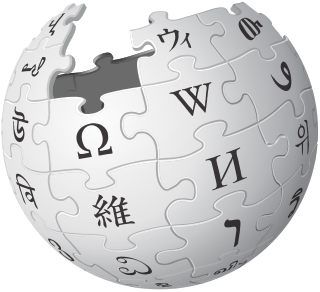
An encyclopedia or encyclopaedia is a reference work or compendium providing summaries of knowledge, either general or special, in a particular field or discipline. Encyclopedias are divided into articles or entries that are arranged alphabetically by article name or by thematic categories, or else are hyperlinked and searchable. Encyclopedia entries are longer and more detailed than those in most dictionaries. Generally speaking, encyclopedia articles focus on factual information concerning the subject named in the article's title; this is unlike dictionary entries, which focus on linguistic information about words, such as their etymology, meaning, pronunciation, use, and grammatical forms.

The Encyclopædia Britannica is a general knowledge English-language encyclopaedia. It has been published by Encyclopædia Britannica, Inc. since 1768, although the company has changed ownership seven times. The 2010 version of the 15th edition, which spans 32 volumes and 32,640 pages, was the last printed edition. Since 2016, it has been published exclusively as an online encyclopaedia.

The Encyclopædia Britannica Eleventh Edition (1910–1911) is a 29-volume reference work, an edition of the Encyclopædia Britannica. It was developed during the encyclopaedia's transition from a British to an American publication. Some of its articles were written by the best-known scholars of the time. This edition of the encyclopaedia, containing 40,000 entries, has entered the public domain and is readily available on the Internet. Its use in modern scholarship and as a reliable source has been deemed problematic due to the outdated nature of some of its content. Modern scholars have deemed some articles as cultural artifacts of the 19th and early 20th centuries. Nevertheless, the 11th edition has retained considerable value as a time capsule of scientific and historical information, as well as scholarly attitudes of the era immediately preceding World War I.

The Columbia Encyclopedia is a one-volume encyclopedia produced by Columbia University Press and, in the last edition, sold by the Gale Group. First published in 1935, and continuing its relationship with Columbia University, the encyclopedia underwent major revisions in 1950 and 1963; the current edition is the sixth, printed in 2000. It contains over 51,000 articles totaling some 6.5 million words and has also been published in two volumes.
The World Book Encyclopedia is an American encyclopedia. World Book was first published in 1917. Since 1925, a new edition of the encyclopedia has been published annually. Although published online in digital form for a number of years, World Book is currently the only American encyclopedia which also still provides a print edition. The encyclopedia is designed to cover major areas of knowledge uniformly, but it shows particular strength in scientific, technical, historical and medical subjects.
An online encyclopedia, also called an Internet encyclopedia, is a digital encyclopedia accessible through the Internet. Some examples include Encyclopedia.com since 1998, Encarta from 2000 to 2009, Wikipedia since 2001, and Encyclopædia Britannica since 2016.

Merriam-Webster, Incorporated is an American company that publishes reference books and is mostly known for its dictionaries. It is the oldest dictionary publisher in the United States.

The Brockhaus Enzyklopädie is a German-language encyclopedia which until 2009 was published by the F. A. Brockhaus printing house.

The Encyclopaedia Judaica is a multi-volume English-language encyclopedia of the Jewish people, Judaism, and Israel. It covers diverse areas of the Jewish world and civilization, including Jewish history of all eras, culture, holidays, language, scripture, and religious teachings. First published in 1971–1972, by 2010 it had been published in two editions accompanied by a few revisions.

Encyclopædia Iranica is a project whose goal is to create a comprehensive and authoritative English-language encyclopedia about the history, culture, and civilization of Iranian peoples from prehistory to modern times.
Encyclopædia Britannica, Inc. is the company known for publishing the Encyclopædia Britannica, the world's oldest continuously published encyclopaedia. The company also owns the American dictionary publisher Merriam-Webster. Originally founded in Edinburgh, Scotland and historically British, the company is now based in Chicago, Illinois, in the United States.
In text retrieval, full-text search refers to techniques for searching a single computer-stored document or a collection in a full-text database. Full-text search is distinguished from searches based on metadata or on parts of the original texts represented in databases.
Martindale-Hubbell is an information services company to the legal profession that was founded in 1868. The company publishes the Martindale-Hubbell Law Directory, which provides background information on lawyers and law firms in the United States and other countries. It also published the Martindale Hubbell Law Digest, a summary of laws around the world. Martindale-Hubbell is owned by consumer website company Internet Brands.
A search engine results page (SERP) is a webpage that is displayed by a search engine in response to a query by a user. The main component of a SERP is the listing of results that are returned by the search engine in response to a keyword query.

The Encyclopedia of Mathematics is a large reference work in mathematics.
The Gazetteer for Scotland is a gazetteer covering the geography, history and people of Scotland. It was conceived in 1995 by Bruce Gittings of the University of Edinburgh and David Munro of the Royal Scottish Geographical Society, and contains 25,870 entries as of July 2019. It claims to be "the largest dedicated Scottish resource created for the web". The Gazetteer for Scotland provides a carefully researched and editorially validated resource widely used by students, researchers, tourists and family historians with interests in Scotland.

MicrosoftEncarta is a discontinued digital multimedia encyclopedia and search engine published by Microsoft from 1993 to 2009. Originally sold on CD-ROM or DVD, it was also available online via annual subscription, although later articles could also be viewed for free online with advertisements. By 2008, the complete English version, Encarta Premium, consisted of more than 62,000 articles, numerous photos and illustrations, music clips, videos, interactive content, timelines, maps, atlases and homework tools.

The following outline is provided as an overview of and a topical guide to Wikipedia:










